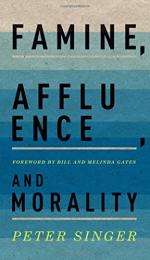|
This section contains 1,482 words (approx. 4 pages at 400 words per page) |

|
Summary
In the final section of the essay, Singer writes that he understands that people may still consider his conclusions to be unorthodox. In order to show that his thinking is not that unusual, he quotes Thomas Aquinas, who wrote that the “natural order instituted by divine providence” requires that we have a duty to help the poor satisfy basic needs, rather than hold onto an excess of material goods for ourselves (239).
Following this, Singer turns his attention to concerns that are practical, rather than theoretical, in nature. In particular, he sets out to address some objections against his idea that donating money to charity is the best way to alleviate suffering.
The first objection is that foreign aid should be the responsibility of the government, not the individual. In particular, individuals should not donate too much of their own money because otherwise governments will...
(read more from the Section 3 Summary)
|
This section contains 1,482 words (approx. 4 pages at 400 words per page) |

|




